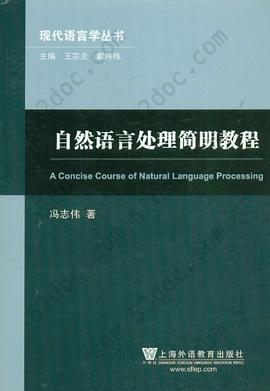注重体验与质量的电子书资源下载网站
分类于: 职场办公 编程语言
简介

Th Grammar of Knowledge: A Cross-Linguistic Typology 豆 0.0分
资源最后更新于 2020-11-17 04:10:31
作者:ALEXANDRAY. AIKHENVALD
出版社:
出版日期:2014-01
ISBN:9780198701316
文件格式: pdf
标签: 语言学 英语 nobutdunbuy
简介· · · · · ·
The Grammar of Knowledge offers both a linguistic and anthropological perspective on the expression of information sources, as well as inferences, assumptions, probability and possibility, and gradations of doubt and beliefs in a range of languages. The book investigates twelve different languages, from families including Tibeto-Burman, Nakh-Dagestani, and Austronesian, all of ...
目录
Preface x
Notes on the contributors xii
Abbreviations xvi
1 Th grammar of knowledge: a cross-linguistic view of evidentials
and the expression of information source 1
Alexandra Y. Aikhenvald
1 Evidentiality and information source 2
2 Evidentiality: a bird’s-eye view 3
3 Information source through other means 19
4 Choosing, and using, an evidential 29
5 How to talk about knowledge 37
6 About this volume 41
Appendix. On terminological clarity 44
References 45
2 Th grammar of knowledge in Hinuq 52
Diana Forker
1 Introduction 52
2 General properties of the evidential system and formal marking 52
3 Lexical expression of information source 61
4 Reported speech constructions, the quotative enclitic, and
evidentiality 63
5 Cultural conventions 65
6 Summary 67
References 67
3 Th expression of knowledge in Tatar 69
Teija Greed
1 Introduction 69
2 Tatars: cultural context and society 69
3 General characteristics of Tatar 70
4 Grammatical expression of information source in Tatar 71
5 Evidential functions of particles 75
6 Evidentials in use 81
7 Lexical expression of knowledge and attitudes towards it 83
8 Historical development and pathways of evidentials 86
vi Contents
9 Conclusion 87
References 87
4 Th grammar of knowledge in Saaroa 89
Chia-jung Pan
1 Preliminaries 89
2 Organization of the evidential system 92
3 Expression of reported evidentials 93
4 Semantics of reported evidentiality 97
5 Th reported evidential and person 98
6 Origins of the reported evidential 100
7 Reported speech as an evidentiality strategy 101
8 Evidential-like meanings through special markers 102
9 Verbs of perception as lexical means to express knowledge 104
10 Evidentiality, communication, and cultural knowledge 105
11 Summary 106
References 106
5 Th grammar of knowledge in Kurtöp: evidentiality, mirativity,
and expectation of knowledge 108
Gwendolyn Hyslop
1 Introduction 108
2 Background 109
3 Perfective 113
4 Imperfective aspect 117
5 Future tense 119
6 Copulas 120
7 Particles 123
8 Putting it together 127
References 130
6 Th expression of knowledge in Ersu 132
Sihong Zhang
1 Th language 132
2 Th data 133
3 An overview 133
4 Evidentials and their semantics 134
5 Evidentiality and other grammatical categories 138
6 Co-occurrence of evidentials 142
7 Information source conveyed through other means 142
8 Summary 145
References 146
Contents vii
7 Evidentiality in Kalmyk 148
Elena Skribnik and Olga Seesing
1 Kalmyk 148
2 Organization of the evidential system 152
3 Direct evidential 152
4 Indirectivity 155
5 Inferred evidential 157
6 Assumed evidential 159
7 Prospective evidential 160
8 Reported evidential 161
9 Common knowledge 163
10 Evidentials in discourse 164
11 Evidentiality strategies: complementation 165
12 Evidentiality strategy: demonstratives and interpretation
of evidence 167
13 Mirativity 168
14 Summary 169
Text corpus 170
References 170
8 Th non-visible marker in Dyirbal 171
R. M. W. Dixon
1 Introduction 171
2 Grammatical background 172
3 Noun markers 174
4 Verb markers 180
5 Bound forms 182
6 Interrogative noun and verb markers 182
7 Meanings of ŋa- markers 183
8 Conclusion 188
Appendix 188
References 189
9 Th grammar of knowledge in Maaka (Western Chadic, Nigeria) 190
Anne Storch and Jules Jacques Coly
1 Introduction 190
2 Evidentiality, information source, and truth 195
3 Transmission of knowledge 202
4 Lexical expression of perception and cognition 204
5 Conclusions 206
References 207
viii Contents
10 Expression of information source meanings in Ashéninka Perené
(Arawak) 209
Elena Mihas
1 Introduction 209
2 Information source extensions of modal operators and of the verb amampy
‘be in the shade’ 211
3 Other means of expressing evidential-like meanings 220
4 Conclusions 225
References 226
11 Nominalization, knowledge, and information source in Aguaruna
(Jivaroan) 227
Simon E. Overall
1 Background information and typological profie 227
2 Cultural practices 228
3 Expressing and talking about knowledge 229
4 Nominalization in Aguaruna 232
5 Why nominalize a verb if you’re going to use it to head a fiite clause? 239
6 Th areal context 242
References 242
12 Th grammar of knowledge in Tima 245
Gerrit J. Dimmendaal
1 Preliminary observations 245
2 Th temporal dimension: construction-type effcts 247
3 Th spatial dimension: the viewer-centred perspective 250
4 Th referential dimension: logophoricity marking as an evidential hedging
strategy 253
5 Sharing experiential knowledge: the expressive use of ideophones 256
6 Some preliminary conclusions 257
References 258
13 Saying, seeing, and knowing among the Karawari of Papua New Guinea 260
Borut Telban
1 Speaking 262
2 Th creation of knowledge 268
3 Aykapɨkan ‘remember, learn, reflct, know’ 271
4 Hearing and seeing 273
5 Mirativity 274
Contents ix
6 Conclusion 275
References 277
Index of authors 279
Index of languages, language families, and linguistic areas 282
Index of subjects 285
Notes on the contributors xii
Abbreviations xvi
1 Th grammar of knowledge: a cross-linguistic view of evidentials
and the expression of information source 1
Alexandra Y. Aikhenvald
1 Evidentiality and information source 2
2 Evidentiality: a bird’s-eye view 3
3 Information source through other means 19
4 Choosing, and using, an evidential 29
5 How to talk about knowledge 37
6 About this volume 41
Appendix. On terminological clarity 44
References 45
2 Th grammar of knowledge in Hinuq 52
Diana Forker
1 Introduction 52
2 General properties of the evidential system and formal marking 52
3 Lexical expression of information source 61
4 Reported speech constructions, the quotative enclitic, and
evidentiality 63
5 Cultural conventions 65
6 Summary 67
References 67
3 Th expression of knowledge in Tatar 69
Teija Greed
1 Introduction 69
2 Tatars: cultural context and society 69
3 General characteristics of Tatar 70
4 Grammatical expression of information source in Tatar 71
5 Evidential functions of particles 75
6 Evidentials in use 81
7 Lexical expression of knowledge and attitudes towards it 83
8 Historical development and pathways of evidentials 86
vi Contents
9 Conclusion 87
References 87
4 Th grammar of knowledge in Saaroa 89
Chia-jung Pan
1 Preliminaries 89
2 Organization of the evidential system 92
3 Expression of reported evidentials 93
4 Semantics of reported evidentiality 97
5 Th reported evidential and person 98
6 Origins of the reported evidential 100
7 Reported speech as an evidentiality strategy 101
8 Evidential-like meanings through special markers 102
9 Verbs of perception as lexical means to express knowledge 104
10 Evidentiality, communication, and cultural knowledge 105
11 Summary 106
References 106
5 Th grammar of knowledge in Kurtöp: evidentiality, mirativity,
and expectation of knowledge 108
Gwendolyn Hyslop
1 Introduction 108
2 Background 109
3 Perfective 113
4 Imperfective aspect 117
5 Future tense 119
6 Copulas 120
7 Particles 123
8 Putting it together 127
References 130
6 Th expression of knowledge in Ersu 132
Sihong Zhang
1 Th language 132
2 Th data 133
3 An overview 133
4 Evidentials and their semantics 134
5 Evidentiality and other grammatical categories 138
6 Co-occurrence of evidentials 142
7 Information source conveyed through other means 142
8 Summary 145
References 146
Contents vii
7 Evidentiality in Kalmyk 148
Elena Skribnik and Olga Seesing
1 Kalmyk 148
2 Organization of the evidential system 152
3 Direct evidential 152
4 Indirectivity 155
5 Inferred evidential 157
6 Assumed evidential 159
7 Prospective evidential 160
8 Reported evidential 161
9 Common knowledge 163
10 Evidentials in discourse 164
11 Evidentiality strategies: complementation 165
12 Evidentiality strategy: demonstratives and interpretation
of evidence 167
13 Mirativity 168
14 Summary 169
Text corpus 170
References 170
8 Th non-visible marker in Dyirbal 171
R. M. W. Dixon
1 Introduction 171
2 Grammatical background 172
3 Noun markers 174
4 Verb markers 180
5 Bound forms 182
6 Interrogative noun and verb markers 182
7 Meanings of ŋa- markers 183
8 Conclusion 188
Appendix 188
References 189
9 Th grammar of knowledge in Maaka (Western Chadic, Nigeria) 190
Anne Storch and Jules Jacques Coly
1 Introduction 190
2 Evidentiality, information source, and truth 195
3 Transmission of knowledge 202
4 Lexical expression of perception and cognition 204
5 Conclusions 206
References 207
viii Contents
10 Expression of information source meanings in Ashéninka Perené
(Arawak) 209
Elena Mihas
1 Introduction 209
2 Information source extensions of modal operators and of the verb amampy
‘be in the shade’ 211
3 Other means of expressing evidential-like meanings 220
4 Conclusions 225
References 226
11 Nominalization, knowledge, and information source in Aguaruna
(Jivaroan) 227
Simon E. Overall
1 Background information and typological profie 227
2 Cultural practices 228
3 Expressing and talking about knowledge 229
4 Nominalization in Aguaruna 232
5 Why nominalize a verb if you’re going to use it to head a fiite clause? 239
6 Th areal context 242
References 242
12 Th grammar of knowledge in Tima 245
Gerrit J. Dimmendaal
1 Preliminary observations 245
2 Th temporal dimension: construction-type effcts 247
3 Th spatial dimension: the viewer-centred perspective 250
4 Th referential dimension: logophoricity marking as an evidential hedging
strategy 253
5 Sharing experiential knowledge: the expressive use of ideophones 256
6 Some preliminary conclusions 257
References 258
13 Saying, seeing, and knowing among the Karawari of Papua New Guinea 260
Borut Telban
1 Speaking 262
2 Th creation of knowledge 268
3 Aykapɨkan ‘remember, learn, reflct, know’ 271
4 Hearing and seeing 273
5 Mirativity 274
Contents ix
6 Conclusion 275
References 277
Index of authors 279
Index of languages, language families, and linguistic areas 282
Index of subjects 285








